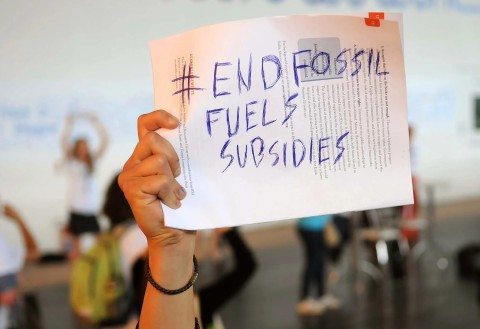
This article originally ran in the National Observer.
The UN Climate talks ended with a global commitment to transition away from fossil fuels and Environment Minister Steven Guilbeault celebrated Canada’s leadership role in negotiating the agreement.
Now it’s time for the federal government to recognize the full extent of its financial support for the fossil fuel industry and bring it to an end. All told, the International Monetary Fund estimates Canada subsidized fossil fuels to the tune of almost $50 billion in 2022 alone, including the cost of damage to our health and environment. Costs associated with the impacts of fossil fuel production and use will take time to reduce, but the government is handing billions of dollars over through a variety of ways, including our tax system.
Beyond grants, loans and other forms of direct financial support, Canada has subsidised our fossil fuel industries for decades through tax deductions and credits. For example, the Parliamentary Budget Office recently found that Canada lost $1.8 billion in tax revenue in 2021 by allowing deductions for fossil fuel exploration and development costs.
That is just the tip of the iceberg. Our own research found at least three other ways Canada loses revenue through tax breaks to fossil fuels.
First, the sector enjoys overly generous Capital Cost Allowances, a special business deduction for the depreciation of equipment and other assets. Since 2000, the fossil fuel sector has been one of the largest claimants of CCAs, with allowances that run 40 per cent to 70 per cent higher than the actual cost of depreciation. The bill to Canadians in terms of foregone tax revenue is $20 billion and counting.
Oil and gas corporations have also been one of the largest beneficiaries of Canada’s capital gains exclusion, which discounts the tax paid on income from assets by 50 per cent. That tax break alone has handed these companies $4.7 billion since 2010.
In addition, Canada’s oil and gas extraction industries, refineries, and pipelines have cumulatively claimed over $20 billion in tax credits in the last decade, according to our newest report.
The truth is, Canada has spent three decades attempting to use tax breaks to incentivize emissions reductions with little evidence of results. In fact, the oil and gas extraction, refining, and coal mining industries have increased their emissions intensity — the emissions per unit of production — on average between 2010 and 2020, while other sectors of the economy saw emission reductions.
Canada recently moved forward on a decade-old international commitment to ending “inefficient” subsidies for fossil fuels, releasing a framework for action in 2023. Critics rightly question what is deemed “inefficient” and what is still allowed under the new rules.
The fossil fuel sector has been one of the most profitable in the last few years, which begs the question of why any subsidy would be considered “efficient.” It would be much more efficient to simply mandate reductions and force investment of some portion of that profit into emission reduction activities. The new cap and trade legislation announced early last fall is a good, albeit slow, start.
However, new tax credits worth billions for carbon capture and other emission reduction initiatives will be made available to fossil fuel companies, all considered “efficient” under the new framework. It’s unclear what actual proof of emission reductions is attached to the credits. There are no rules to assure funds saved through the credit aren’t just funnelled to expand production and increase the industry’s footprint.
The federal government needs to think holistically about how we support fossil fuels through the tax system, direct government funding, and other financial aid.
Despite this, having a fulsome conversation on fossil fuel supports in Canada remains difficult. This is largely due to the federal government keeping its inventory of such measures, created as part of its new subsidies framework, secret.
It's absurd that the public does not have access to a full accounting of how our government subsidizes fossil fuels, which are scheduled for phase-out, and which are generously enabled by our tax dollars.
If we want to get serious about ending our relationship with fossil fuels, we need transparency about how our government supports the industries that produce them and a real conversation about how that support ends. Otherwise, there is little chance that Canada will be able to meet the COP28 commitment it helped forge.
Katrina Miller is the executive director of the Canadians for Tax Fairness, Canada’s top experts on how progressive taxation can lead us to a just society.
